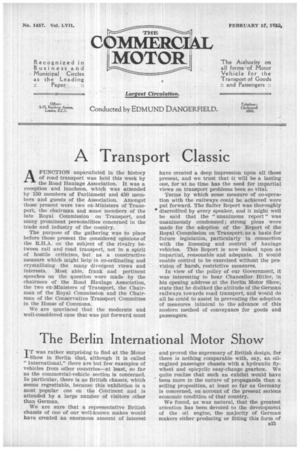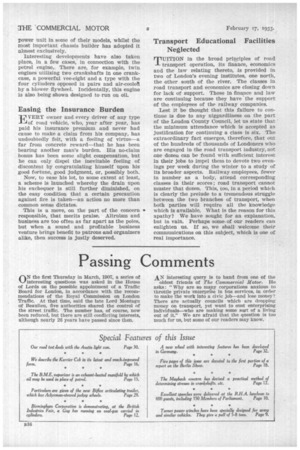The Berlin International Motor Show
Page 29

Page 30

If you've noticed an error in this article please click here to report it so we can fix it.
TT was rather surprising to find at the Motor -I-Show in Berlin that, although it is called "International," there are but few examples of vehicles from other countries—at least, so far as the commercial-vehicle section is concerned. In particular, there is no British chassis, which seems regrettable, because this exhibition is a most popular one on the Continent and is attended by a large number of visitors other than German.
We are sure that a representative British chassis of one of our well-known makes would have created an enormous amount of interest and proved the supremacy of British design, for there is nothing comparable with, say, an oilengined passenger chassis with a hydraulic flywheel and epicyclic easy-change gearbox. We quite realize that such an exhibit would have been more in the nature of propaganda than a selling proposition, at least so far as Germany is concerned, on account of the present serious economic condition of that country.
We found, as was natural, that the greatest attention has been devoted to the development of the oil engine, the majority of German makers either producing or fitting this form of power unit in some of their models, whilst the most important chassis builder has adopted it almost exclusively.
Interesting developments have also taken place, in a few cases,. in connection with the petrol engine. There are, for example, twin engines utilizing two crankshafts in one crankcase, a powerful vee-eight and a type with the four cylinders opposed in pairs and air-coolett by a blower flywheel. Incidentally, this engine is also being shown designed to run on oil.
Easing the Insurance Burden
'Li VERY owner and every driver of any type -.1of road vehicle, who, year after year, has paid his insurance premlium and never had cause to make a claim from his company, has undoubtedly felt, with a feeling of virtue—a far from concrete reward—that he has been bearing another man's burden. His no-claim bonus has been some slight compensation, but he can only dispel the inevitable feeling of discontent by congratulating himself upon his good fortune, good judgment, or, possibly both.
Now, to ease his lot, to some extent at least, a scheme is launched whereby the drain upon his exchequer is still further diminished, on the easy condition that a certain precaution against fire is taken—an action no more than common sense dictates.
This is a move, on the part of the concern responsible, that merits praise. Altruism and business are too often as far apart as the poles, but when a sound and profitable business venture brings benefit to patrons and organizers alike, then success is justly deserved.
Transport Educational Facilities Neglected
TUITION in the broad principles of road transport operation, its finance, economics and the law relating thereto, is provided in. two of London's evening institutes, one north, the other south of the river. The classes in road transport and economics are closing down for lack of support. Those in finance and law are continuing because they have the support of the employees of the railway companies.
Lest it be thought that this failure to continue is due to any niggardliness on the part of the London County Council, let us state that ' the minimum attendance which is accepted as justification for continuing a class is six. The extraordinary fact emerges, therefore, that out of the hundreds of thousands of Londoners who are engaged in the road transport industry, not one dozen can be found with sufficient interest in their jobs to impel them to devote two evenings per week during the winter to a study of Its broader aspects. Railway employees, fewer in number as a body, attend corresponding classes in their scores ; road transport cannot muster that dozen. This, too, in a period which is clearly the prelude to a tremendous struggle between the two branches of transport, when both parties will require all the knowledge • which is available. What is the reason for this apathy? We have sought for an explanation, but in vain. Perhaps some of our readers can enlighten us. If so, we shall welcome their communications on this subject, which is one of real importance.




























































































